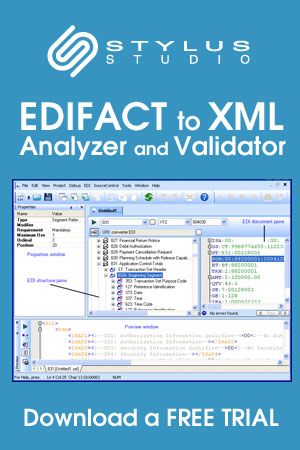

|
Return to Stylus Studio EDIFACT home page. Return to Stylus Studio EDIFACT D99B Messages page. Balance message
0. INTRODUCTIONThis specification provides the definition of the Balance message (BALANC) to be used in Electronic Data Interchange (EDI) between trading partners involved in administration, commerce and transport. 1. SCOPE1.1. Functional DefinitionA message used to exchange enterprise related balances between the enterprise and whoever may use them for the purpose of accounting, auditing, cost accounting, consolidation, financial analysis, etc. 1.2. Field of ApplicationThe Balance message may be used for both national and international applications. It is based on universal practice related to administration, commerce and transport, and is not dependent on the type of business or industry. 1.3. PrinciplesThe accounting and auditing partners of an enterprise require accounting information, most of which is of a common nature. In order, therefore, to cope with the practice, an enterprise (parent company, subsidiary, division, etc.), a service bureau, a chartered accountant or an auditor - referred to as a sender
2. REFERENCESSee UNTDID, Part 4, Chapter 2.3 UN/ECE UNSM - General Introduction, Section 1. 3. TERMS AND DEFINITIONS3.1. Standard terms and definitionsSee UNTDID, Part 4, Chapter 2.3 UN/ECE UNSM - General Introduction, Section 2. 4. MESSAGE DEFINITION4.1. Segment ClarificationThis section should be read in conjunction with the segment table which indicates mandatory, conditional and repeating requirements. 0010 UNH, Message headerA service segment starting and uniquely identifying a message. The message type code for the Balance message is BALANC. Note: Balance messages conforming to this document must contain the following data in segment UNH, composite S009:
0020 BGM, Beginning of messageA segment identifying the balance message. 0030 DTM, Date/time/periodA segment containing balance opening and closing dates and its preparation date. 0040 RFF, ReferenceA segment containing the number of the balance linked to the message and its version number. 0050 CUX, CurrenciesA segment providing currencies which are specific to the balance message. 0060 FTX, Free textA segment containing free text information, in coded or clear form, giving additional clarifications solely concerning the summary section. In computer-to-computer exchanges such text information will normally require the receiver to process this segment manually. 0070 Segment Group 1: NAD-RFF-SG2A segment group giving information on sender, recipient and intermediary. 0080 NAD, Name and addressA segment to identify a party. 0090 RFF, ReferenceA segment to provide references which are specific to the concerned party. 0100 Segment Group 2: CTA-COMA segment group to identify contacts and related communication numbers. 0110 CTA, Contact informationA segment to provide contacts related to the party. 0120 COM, Communication contactA segment to provide communication numbers of the contact. 0130 Segment Group 3: CCI-CAVA group of segments to provide accounting, fiscal, social or legal characteristics of the enterprise accounting balance. 0140 CCI, Characteristic/class idA segment to identify a characteristic. 0150 CAV, Characteristic valueA segment to provide the value of the characteristic. 0160 Segment Group 4: LIN-MOA-DTM-RFF-QTY-SG5A segment group providing the following relevant information for a given period of the balance : account number and its identification, period, quantity, stated value and record number. 0170 LIN, Line itemA segment indicating the trial balance line number within the message. 0180 MOA, Monetary amountA segment containing detailed information about debit or credit trend of the amount, the amount itself in local and original currency and the currency code relating to these amounts. 0190 DTM, Date/time/periodA segment giving detailed information on the opening and closing dates of account. 0200 RFF, ReferenceA segment containing a reference number which may be a journal page number (folio) and sequence number within the folio (line) as a single reference number or a serial number assigned at bookkeeping entry level (record number) for a given period. 0210 QTY, QuantityA segment specifying the quantity and the measure unit relative to the amount of the accounting trial balance. 0220 Segment Group 5: CPT-SG6A segment group containing detailed information identifying an account. 0230 CPT, Account identificationA segment containing detailed information identifying the treated main account number and its subsidiary account numbers. 0240 Segment Group 6: CCI-CAVA group of segments to provide accounting, fiscal, social or legal characteristics of the account. 0250 CCI, Characteristic/class idA segment to identify a characteristic. 0260 CAV, Characteristic valueA segment to provide the value of the characteristic. 0270 Segment Group 7: EQN-MOAA segment group providing information on trial balance amounts and quantities. This group provides totals for verification purposes. 0280 EQN, Number of unitsA segment specifying the number of balance lines for a given period relative to the balance message. 0290 MOA, Monetary amountA segment adding up the total amounts in local and all foreign currencies in the balance message. 0300 Segment Group 8: AUT-DTMA segment group to provide authentication information. 0310 AUT, Authentication resultA segment to provide authentication results. 0320 DTM, Date/time/periodA segment to provide the date of authentication. 0330 UNT, Message trailerA service segment ending a message, giving the total number of segments in the message (including the UNH & UNT) and the control reference number of the message. 4.2. Segment index (Alphabetical sequence by tag)
4.3. Message structure4.3.1. Segment table
Return to Stylus Studio EDIFACT D99B Messages page. |

|
| Site Map | Privacy Policy | Terms of Use | Trademarks |